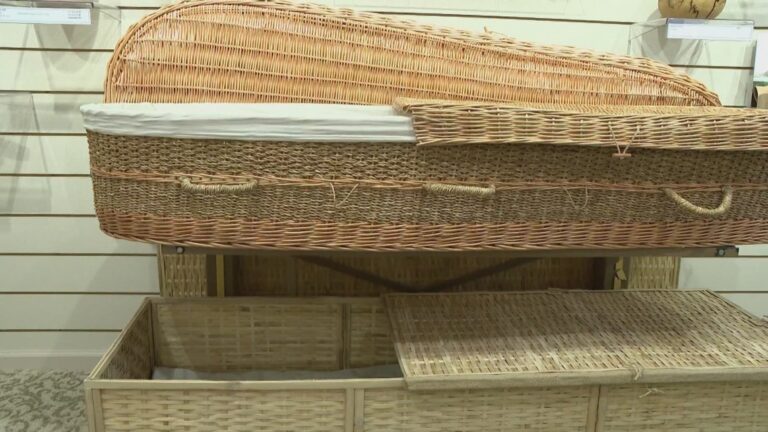With high costs forcing many bereaved families to opt for cheaper cremations, “green funerals” could be a welcome alternative.
ARKANSAS, USA — One of the less-enviable jobs a funeral director has to do is guide grieving people through one of the saddest periods of their lives, then hand them a bill for one of the most expensive periods of their lives.
And lately, the cost has been more unbearable than the grief.
“I was just tired of not being able to think of a way to give people that option,” said Jason Kirby, who runs a family-owned funeral and cremation center in Mountain Home. “I’ve seen so many families choose cremation based solely on price because they can’t afford to bury their loved ones.”
The choice of cremation rather than the traditional method of burial – a polished casket buried six feet underground in a concrete ossuary – is one of the biggest changes he has seen growing up in the industry.
“Families’ desire for lower-cost options, such as cremation, has brought challenges but also brought positive change to our profession,” he said.
Kirby explained that cremation now accounts for 70 percent of the funeral services he provides, a shift that has prompted him to change the layout of the industry he grew up in.
He recalls doing his homework on the embalming table next to his father; the examination room now takes up much less space. His childhood bedroom once adjoined a small urn showroom; now the showrooms have swapped locations; the casket display is at the back of the house.
“We’ve added a crematorium here. [in 2016] “We designed this room just for cremation families,” Kirby said as she led us around a space with comfy couches, plenty of tissue boxes and the hum of a huge crematorium furnace visible behind windows and sand-colored walls.
The space allows families to actually take charge of laying their loved one to rest in the giant room, or they can be present in a nearby room while the funeral takes place. Either way, Kirby can sell the full-service experience at a more affordable price.
“Can you think of an industry in the economy that hasn’t seen prices go up over the last 30 or 40 years?” asked Robert Akers, director of the state Funeral Services Agency, which sits within the Insurance Department and is the go-to place for complaints about costs.
He sensed a trend towards cremation.
“I don’t think 10 or 15 years ago, anyone wanted to talk about cremation,” said Amy Good, executive director of the state’s Funeral Commission. “My mother said, ‘Don’t cremate me. I want to be buried.'”
There’s not much the funeral society can do for people intimidated by the cost of a full-service burial, but Good has been keeping a close eye on what Kirby is trying to do.
“A ‘green funeral’ is a funeral that typically involves no coffin, urn or embalming, and the body is wrapped in cloth and placed in the ground covered with soil,” Good explained.
Currently, Kirby is the only professional offering this simplified concept in Arkansas.
“People can get the services they want and go to a beautiful cemetery without spending a ton of money on products,” Kirby said, citing a perpetually maintained cemetery that his family owns and maintains as a key reason he pioneered green funerals.
Tucker Memorial Cemetery in Kirby has all the traditional touches, including towering headstones that sit atop concrete crypts six feet below manicured lawns. There’s also a marble mausoleum and a garden for scattering ashes. There’s also a special roped-off area at the back of the grounds reserved for green burials.
“Our graves are shallow, we have no coffins or ossuaries, we don’t use any embalming chemicals and our headstones are different from others,” Kirby said as he led the tour, explaining that the stones are made from rough stone that is discarded during the process of making traditional headstones.
This keeps with the theme of recycling: Initially, the demand for natural organic reduction (a more technical term for “green burial”) came from people concerned about the environment.
Goode is watching to see if other Arkansas funeral directors will join Kirby soon and has been monitoring other methods that have been tried in other states.
“We want to be proactive, not reactive,” she said of the early efforts to prepare laws and regulations for the future. “I think it’s going to be a while before we actually have people in Arkansas who want to set up alkaline hydrolysis chambers or ‘non’ natural organic reduction chambers, because we don’t have those facilities here yet.”
“As this technology becomes more widespread and we get more advertising and industry exposure, I suspect we’ll see an increase in inquiries,” Akers said.
But other factors could accelerate that timeline.
“That’s about half the cost of a traditional burial,” Kirby said, “and there are packages for green burials that cost around $4,000.”
This will appeal to people hoping to avoid paying huge burial costs, and those looking to reduce their impact on the earth when they are buried.
“We still have space for families who want a casket,” Kirby said, “and while some people will want cremation, we’re really pleased to have another option for the families that we care for.”

